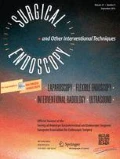Abstract
Background
The authors have previously documented a 100% certification pass rate immediately after a proficiency-based skills training curriculum for the Fundamentals of Laparoscopic Surgery (FLS) program. This study aimed to determine the durability of skills acquired after initial training.
Methods
For this study, 21 novice medical students were enrolled in institutional review board (IRB)-approved protocols at two institutions. As previously reported, all the participants successfully completed a structured proficiency-based training curriculum by practicing the five FLS tasks in a distributed fashion over a 2-month period. Pre- and posttesting was conducted, and standard testing metrics were used. The participants were recruited for repeat testing 6 months (retention 1) and 1 year (retention 2) after initial curriculum completion. Of the original 21 students, 15 (10 at University of Texas Southwestern and 5 at Uniformed Services University) were available and agreed to participate. The participants had no additional skills lab training and minimal clinical laparoscopic exposure.
Results
None of the 15 participants demonstrated proficiency at the initial pretest (mean score, 146 ± 65), and performance showed significant improvement (p < 0.001) at the posttest (469 ± 20). The participants retained a very high level of performance at retention 1 (437 ± 39; 93% retention of the posttest score) and retention 2 (444 ± 55; 95% retention of the posttest score). Their performance at both retention testing-intervals was sufficient for passing the certification exam (270 cutoff score for passing) with a comfortable margin. There were no significant differences in performance between the two institutions at any time points.
Conclusion
The proficiency-based FLS skills curriculum reliably results in a high level of skill retention, even in the absence of ongoing simulator-based training or clinical experience. This curriculum is suitable for widespread implementation.


Similar content being viewed by others
References
Scott DJ, Bergen PC, Rege RV, Laycock R, Tesfay ST, Valentine RJ, Euhus DM, Jeyarajah DR, Thompson WM, Jones DB (2000) Laparoscopic training on bench models: better and more cost effective than operating room experience. J Am Coll Surg 191:272–283
Korndorffer JR Jr, Scott DJ, Sierra R, Brunner WC, Dunne JB, Slakey DP, Townsend MC, Hewitt RL (2005) Developing and testing competency levels for laparoscopic training. Arch Surg 140:80–84
Seymour NE, Gallagher AG, Roman SA, O’Brien MK, Bansal VK, Anderson DK, Satava RM (2002) Virtual reality training improves operating room performance: results of a randomized, double-blinded study. Ann Surg 236:458–464
Fried GM, Feldman LS, Vassilou MC, Fraser SA, Stanbridge D, Ghitulescu G, Andrew CG (2004) Proving the value of simulation in laparoscopic surgery. Ann Surg 240:518–528
Accreditation Council for Graduate Medical Education. http://www.acgme.org/acWebsite/downloads/RRC_progReq/440_general_surgery_01012008_u08102008.pdf. Accessed 13 May 2009
Derossis AM, Bothwell J, Sigman HH, Fried GM (1998) The effect of practice on performance in a laparoscopic simulator. Surg Endosc 12:1117–1120
Peters JH, Fried GM, Swanstrom LL, Soper NJ, Sillin LF, Schrimer B, Hoffman K, SAGES FLS Committee (2004) Development and validation of a comprehensive program of education and assessment of the basic fundamentals of laparoscopic surgery. Surgery 135:21–27
Fundamentals of Laparoscopic Surgery. www.flsprogram.org. Accessed 13 May 2009
Scott DJ, Ritter EM, Tesfay ST, Pimentel EA, Nagji A, Fried GM (2008) Certification pass rate of 100% for Fundamentals of Laparoscopic Surgery skills after proficiency-based training. Surg Endosc 22:1887–1893
Ritter EM, Scott DJ (2007) Design of a proficiency-based skills training curriculum for the Fundamentals of Laparoscopic Surgery. Surg Innov 14:107–112
American College of Surgeons, Division of Education. http://www.facs.org/education/surgicalskills.html. Accessed 13 May 2009
Scott DJ, Dunnington GL (2008) The new ACS/APDS skills curriculum: moving the learning curve out of the operating room. J Gastrointest Surg 12:213–221
Scott DJ, Goova MT, Tesfay ST (2007) A cost-effective proficiency-based knot-tying and suturing curriculum for residency programs. J Surg Res 141:7–15
Fraser SA, Klassen DR, Feldman LS, Ghitulescu GA, Stanbridge D, Fried GM (2003) Evaluating laparoscopic skills: setting the pass/fail score for the MISTELS system. Surg Endosc 17:964–967
Ericsson KA (2004) Deliberate practice and the acquisition and maintenance of expert performance in medicine and related domains. Acad Med 79:S70–S81
Moulton CA, Dubrowski A, Macrae H, Graham B, Grober E, Reznick R (2006) Teaching surgical skills: what kind of practice makes perfect? A randomized, controlled trial. Ann Surg 244:400–409
Scott DJ (2008) Proficiency-based training for surgical skills. Semin Colon Rectal Surg 19:72–80
Korndorffer JR Jr, Dunne JB, Sierra R, Stefanidis D, Touchard CL, Scott DJ (2005) Simulator training for laparoscopic suturing using performance goals translates to the operating room. J Am Coll Surg 201:23–29
Disclosures
Daniel Scott has a licensing agreement with Ethicon Endosurgery regarding Magnetic Anchoring and Guidance Systems (MAGS). He also has research grants with Ethicon Endosurgery. Dr. Scott is a speaker for Covidien and also has research grants with this company. He is a speaker for Allergan and has research and equipment grants with Storz. Dr. Scott is a consultant for Accelerated Technologies Incorporated and receives both honoraria and reimbursed travel for any activities that may involve any role previously described. Madelyn Rosenthal, Matt Ritter, Antonio Castellvi, Seifu Tesfay, and Mouza Goova have no conflicts of interest or financial ties to disclose.
Author information
Authors and Affiliations
Corresponding author
Rights and permissions
About this article
Cite this article
Rosenthal, M.E., Ritter, E.M., Goova, M.T. et al. Proficiency-based Fundamentals of Laparoscopic Surgery skills training results in durable performance improvement and a uniform certification pass rate. Surg Endosc 24, 2453–2457 (2010). https://doi.org/10.1007/s00464-010-0985-2
Received:
Accepted:
Published:
Issue Date:
DOI: https://doi.org/10.1007/s00464-010-0985-2




